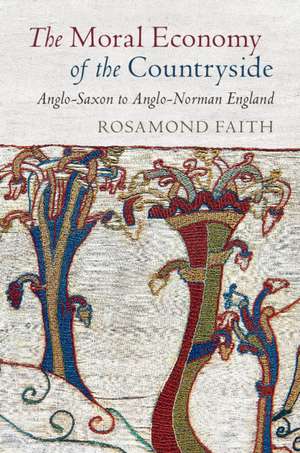The Moral Economy of the Countryside: Anglo-Saxon to Anglo-Norman England
Autor Rosamond Faithen Limba Engleză Paperback – 30 oct 2019
| Toate formatele și edițiile | Preț | Express |
|---|---|---|
| Paperback (1) | 187.51 lei 3-5 săpt. | +24.40 lei 4-10 zile |
| Cambridge University Press – 30 oct 2019 | 187.51 lei 3-5 săpt. | +24.40 lei 4-10 zile |
| Hardback (1) | 476.89 lei 38-44 zile | |
| Cambridge University Press – 30 oct 2019 | 476.89 lei 38-44 zile |
Preț: 187.51 lei
Nou
Puncte Express: 281
Preț estimativ în valută:
35.88€ • 37.33$ • 29.62£
35.88€ • 37.33$ • 29.62£
Carte disponibilă
Livrare economică 24 martie-07 aprilie
Livrare express 07-13 martie pentru 34.39 lei
Preluare comenzi: 021 569.72.76
Specificații
ISBN-13: 9781108720069
ISBN-10: 1108720064
Pagini: 244
Dimensiuni: 154 x 228 x 14 mm
Greutate: 0.64 kg
Editura: Cambridge University Press
Colecția Cambridge University Press
Locul publicării:Cambridge, United Kingdom
ISBN-10: 1108720064
Pagini: 244
Dimensiuni: 154 x 228 x 14 mm
Greutate: 0.64 kg
Editura: Cambridge University Press
Colecția Cambridge University Press
Locul publicării:Cambridge, United Kingdom
Cuprins
1. Introduction: the moral economy; Part I. Rank: 2. Lordship; 3. Our island story; 4. Honour and respect in peasant society; Part II. Reciprocity: 5. Hospitality; 6. Hearth, household and farm; Part III. Reputation and Witness: 7. Neighbours and strangers; 8. Markets and marketing; Part IV. The Wolf Sniffs the Wind: 9. HWILOM WÆS: Archbishop Wulfstan's old social order; 10. Land, law and office; Part V. The Aftermath of Conquest: 11. New words in the countryside; 12. Narrating the new social order; Part VI. In the World of the Manor: 13. Establishing custom; 14. Thinking feudally; 15. From rank to class; 16. Conclusion: forward into the past; Appendix. The family farm in peasant studies; Bibliography; Index.
Recenzii
'In the third of a sequence of magisterial and thought provoking books about early English rural society, Rosamond Faith forces us to face the problem of how lordship managed to establish itself in Anglo-Saxon England at all. Her profound and radical understanding of how peasant life works on the ground shines through at every point. Everyone who is interested in English society before 1200, or indeed later, will have to read this book.' Chris Wickham, University of Oxford
'Representing the fruit of over five decades' work on the medieval peasantry, this book takes us closer to the lived world of the Anglo-Saxon peasantry than I would have ever thought possible. It revises traditional wisdom on a host of important subjects, from the origins of feudalism to the impact on the Norman Conquest, and will be the go-to book on early English rural society and life for many years to come.' Levi Roach, University of Exeter
'Like her previous works, this is a dynamic contribution to the study of an often neglected but vital segment of society. Though attempting, as she does, to get into 'the hearts and minds' of the English peasantry is always fated to be an uphill struggle given the nature of the surviving sources … this volume will become a valuable touchstone for future scholars studying medieval social relations.' Stuart Pracy, Agricultural History Review
'Representing the fruit of over five decades' work on the medieval peasantry, this book takes us closer to the lived world of the Anglo-Saxon peasantry than I would have ever thought possible. It revises traditional wisdom on a host of important subjects, from the origins of feudalism to the impact on the Norman Conquest, and will be the go-to book on early English rural society and life for many years to come.' Levi Roach, University of Exeter
'Like her previous works, this is a dynamic contribution to the study of an often neglected but vital segment of society. Though attempting, as she does, to get into 'the hearts and minds' of the English peasantry is always fated to be an uphill struggle given the nature of the surviving sources … this volume will become a valuable touchstone for future scholars studying medieval social relations.' Stuart Pracy, Agricultural History Review
Notă biografică
Descriere
Shows the 'moral economy' of early medieval England transformed by 'feudal thinking' in the aftermath of the Norman Conquest.
